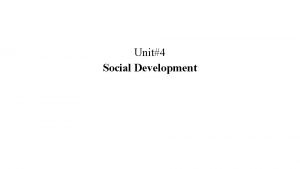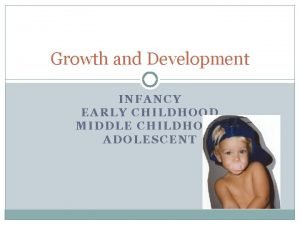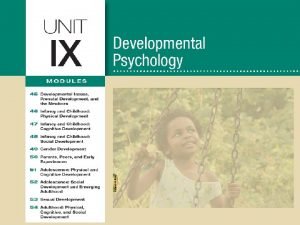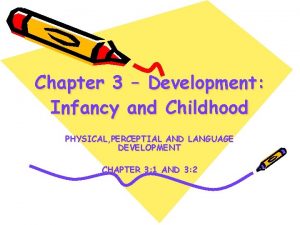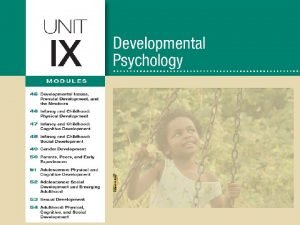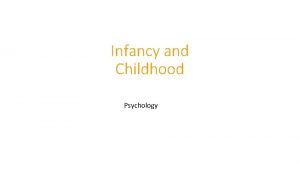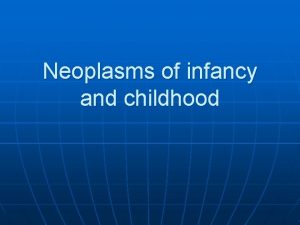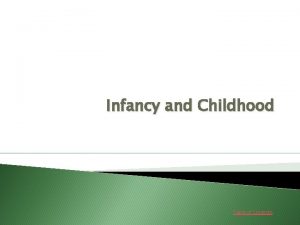INFANCY AND CHILDHOOD SOCIAL DEVELOPMENT STRANGER ANXIETY Stranger










- Slides: 10

INFANCY AND CHILDHOOD SOCIAL DEVELOPMENT

STRANGER ANXIETY • Stranger anxiety: fear of strangers that infants commonly display, beginning by about 8 months of age – Schemas for familiar faces distress

THE ORIGINS OF ATTACHMENT • Attachment: an emotional tie with another person; shown in young children by their seeking closeness to the caregiver and showing distress on separation – Originally understood to be based on the need for nourishment – Harlow’s monkeys https: //www. youtube. com/watch? v=_O 60 TYAIg. C 4 • Body Contact- secure base • Rocking/warmth/feeding

FAMILIARITY • Attachments form during the critical period (optimal period early in the life of the organism when exposure to certain stimuli or experiences produces normal development) • Karl Lorenz – Imprinting (process by which certain animals form strong attachments during an early-life critical period – Ducklings! – Children do NOT imprint- but they do become attached during a less-defined sensitive period • Familiarity is good- safety signal-content

MARY AINSWORTH • Strange Situation (1 year old infants in a lab playroom with mother/stranger) – Attachment styles!


TEMPERAMENT • Temperament- a person’s characteristic emotional reactivity and intensity – Heredity predisposes temperament differences – Temperament differences tend to be relatively stable and persistent • Physiological as well – Anxious, inhibited infants have high variable heart rates and a reactive nervous system – Thus- parenting must vary in response

DEPRIVATION OF ATTACHMENT • Romanian orphanages • Resiliency • Abuse

SELF-CONCEPT • All our thoughts and feelings about ourselves, in answer to the question: Who am I? – Self-esteem is how they feel about who they are – Self-awareness

PARENTING STYLES • Authoritarian- parents impose rules and expect obedience • Permissive-submit to children’s desires, few demands, little punishment • Authoritative- both demanding and responsive, set rules and enforce them but also explain them; open to discussion/allow exceptions
 Social development in infancy
Social development in infancy Early childhood
Early childhood Ap psych schema
Ap psych schema Internally programmed growth of a child
Internally programmed growth of a child Rovee-collier
Rovee-collier Module 47 infancy and childhood cognitive development
Module 47 infancy and childhood cognitive development Definition of intellectual in health and social care
Definition of intellectual in health and social care Infancy and childhood psychology
Infancy and childhood psychology Chapter 10 infancy and childhood
Chapter 10 infancy and childhood Chapter 10 infancy and childhood
Chapter 10 infancy and childhood Chapter 10 infancy and childhood
Chapter 10 infancy and childhood
